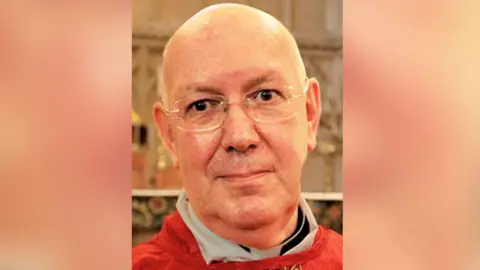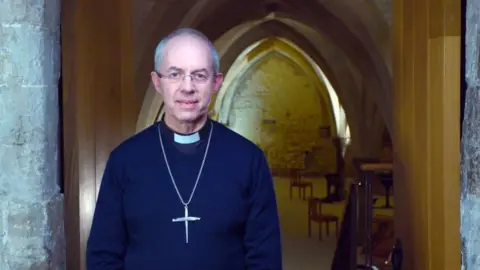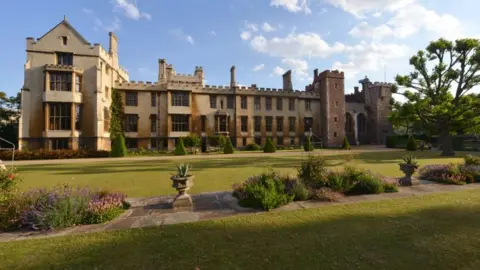Church of England criticised over suicide of falsely accused priest
 Friends Ordinariate of Our Lady of Walsingham
Friends Ordinariate of Our Lady of WalsinghamThe Church of England has been heavily criticised after a priest took his own life due to a mishandled inquiry into false child abuse allegations.
Father Alan Griffin, 78, died in November 2020 having spent a year under investigation without ever having the allegations set out to him.
Coroner Mary Hassell said the claims were "supported by no complainant, no witness and no accuser".
She told the Archbishop of Canterbury of "failings which had come to light".
The Bishop of London, Dame Sarah Mullally, said in a statement: "Alan Griffin's death was a tragedy and my heart goes out to his family for all they have endured. I am deeply sorry for their loss.
"Following the inquest, we have commissioned a 'Lessons Learned' review so that we can fully reflect upon the diocese's actions, and the coroner's comments, in the period leading up to Alan Griffin's death."
'He could not cope'
Ms Hassell wrote a Prevention of Future Deaths report following the inquest into Fr Griffin's death.
The coroner, who recorded the death as a suicide, said Fr Griffin, from Wapping, east London, was found dead in his home on 8 November 2020.
"He was an HIV positive (viral load undetectable) gay priest," Ms Hassell wrote.
"He killed himself because he could not cope with an investigation into his conduct, the detail of and the source for which he had never been told."
Fr Griffin later converted to Roman Catholicism and in June 2020 the Catholic safeguarding team met the priest to discuss a background check.
Ms Hassell wrote: "The Church of England had passed a short written summary of allegations that contained inaccuracies and omitted mention of Fr Griffin's earlier suicide attempt on learning of his HIV status.
"Fr Griffin did not abuse children. He did not have sex with young people under the age of 18. He did not visit prostitutes. He did not endanger the lives of others by having sex with people whilst an HIV risk.
"There was no evidence that he did any of these things."
The investigation into Fr Griffin began because an official in the Anglican Diocese of London was retiring in 2019, the report said.
He suggested to his archdeacon that he undertake a "brain dump" of information he had acquired over the preceding two decades.
Ms Hassell said: "This ranged from descriptions of past convictions that had been dealt with and recorded, through to current safeguarding concerns that might or might not have been acted upon, to what witnesses described as gossip.
"These 42 entries were not accompanied by signed statements setting out distinct allegations.
"The origin of the information in the entries was in places obvious and factual, but in places entirely nebulous."

The coroner addressed many concerns in her report, which she sent to the Archbishop of Canterbury, pointing out the "breadth of the systemic and individual failings that have come to light during the course of this inquest".
Ms Hassell wrote: "It is often the case that organisations have already themselves recognised their errors and have undertaken meaningful attempts at improvement by the time of the inquest.
"This was not the case here."
In her statement, the Bishop of London added: "It remains an absolute priority that, where allegations are made, they are taken seriously, and referrals made where appropriate to statutory agencies and other relevant parties. Our review will examine the decisions that were made in this case, in order to shape any necessary changes to our reporting processes in the future."
In a separate statement, a Lambeth Palace spokesperson said: "This is a highly distressing case and our deepest sympathies and prayers are with the family and friends of Fr Alan Griffin. The archbishop has received a copy of the coroner's report and the matter will be taken extremely seriously. Appropriate discussion and investigation will now take place. Lambeth Palace will be in contact with the relevant other bodies, especially the Diocese of London."
Analysis
Home Affairs correspondent Tom Symonds

Fr Griffin was falsely accused for two reasons, according to the coroner's reports.
Firstly he was said to have "used rent boys", an outdated phrase suggesting the use of male sex workers, but often dangerously interpreted as involving the abuse of children.
There was no evidence of either but the false allegation was compounded by buck-passing within the Church of England.
The head of operations at the Diocese of London included the claim, as part of a "brain dump" of information as he was retiring, but said it was for the archdeacon to deal with.
The archdeacon said assessing whether it was "gossip" was not his job and left it for the director of safeguarding.
The director of safeguarding said deciding what to do should be for "safeguarding professionals".
So no-one took responsibility for making reasonable decisions based on the evidence - with disastrous consequences.
The coroner's findings are damning, and this is a case not from the past, when both churches admit failings in handling allegations of sexual abuse, but from just two years ago.
